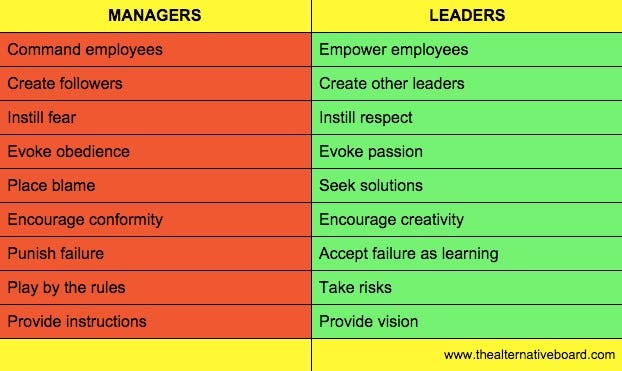Do you manage, or do you lead?
How do we inspire a company culture that supports leaders and not managers?
March 23, 2018

“So, I can manage,” words uttered in the workplace that hit me hard the other day. Ok, you manage, and I will be over here leading — is my mental response.
“Manage” is a word I removed from my leadership vocabulary a long time ago. You manage projects, budgets and forecasting. But, should you manage people?
For me, no matter the leadership opportunity placed in my life’s journey — volunteer or paid, with or without a title — I do not want to “manage” people. I want to lead with passion and inspire others to do the same.
Managers are task-based and mechanical. They assign tasks, limit instructions and expect employees to take off just where they left off. For those who grew up on the farm, does this sound familiar? Is this what your dad expected when you completed a task in the barns or fields: Here are your tools, this is the task and get it completed by the end of the day? What was left unsaid: “and figure out where I left off or do it my way without me showing you how to do it.”
Sandwiched between two of the largest generations on earth today — Baby boomers and Millennials — I witness the transformation within companies and organizations that shift from the priority to manage to focus on leading with passion while people put less priority on the paycheck and more on values. However, some organizations have yet to make the shift, mainly, because senior management is comfortable with always doing it the same way including their management style.
Don’t get me wrong there are some very good managers and certainly very good leaders in the world. Some will argue that certain areas of business require managers to get the job done. Perhaps, that is true, but I think there are still ways to inspire those you manage to be leaders.
While managers and leaders both exist on the job and in a volunteer organization, it is often hard to follow or be an effective team member if you are being managed.
Many of you have probably seen charts discussing the characteristic difference between managers and leaders. This chart explains it well.

Old school management style is barking orders and not asking for input from a member of the team. And if they do ask for your input, it is just a ritual.
As the creme filling between two influential generation groups, I respect the seasoned professional’s wisdom but really admire the millennials’ push for working in company cultures with real values practiced every day from the top down. It is leading with a passion not only for the business but more importantly the industry served.
Being “managed” can sprout frustrated team members. In company cultures that don’t encourage independent thinkers, it is easy to become complacent with taking orders and not asking “why.” For those in supervisory roles, it is easy to bark orders without input, gaining buy-in or worse getting frustrated when some asks “why.”
For me, those words “So, I can manage” was a wake-up call. It was time to conduct a self-check and challenge myself to be a better leader no matter my position. I asked myself: have I grown to accept the ways of others? Have I let others smash my passion? Do I have to “manage” or can I lead? Do I have to accept the pressure to be silent without fighting for what is right, accept status quo or push for something for the greater good?
I will leave you with the words from Lisa Norton, BioZyme Inc. president.
“I love being a part of something that makes a difference. One of the most attractive parts of our company is our motto, ‘care that comes full circle,’” Norton writes with passion. “I love that everyone on our team is so full of passion. This enthusiasm constantly motivates me to keep going even when I am getting tired. Our employees’ passion amazes me daily, but our customers’ passion motivates me, as I believe passion is the one thing our competition can’t copy.”
A president motivated by team members’ enthusiasm gets it. You know without doing business with them that the company culture evokes passion, empowers employees to lead, respects team members’ opinion and trusts their judgment. And in return, the company will attract not only customers but also good team members to serve them for years to come.
You May Also Like



